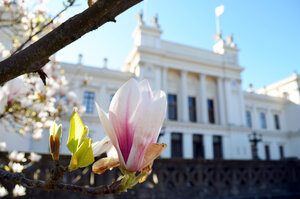Islamic Studies
A timely subject
Within Islamology at Lund University, we study the understanding and practice of Islam in different environments as diverse as Malmö, Chicago, London, Damascus, Jakarta, and Beirut. We research Islam in relation to human rights in Bangladesh, the debates in the Swedish parliament, gender and law in Morocco. Further, we engage in trying to understand Islamic debates on natural science, music, homosexuality, etc. Yet another interest is historical research on, for example, Islamic rhetoric. Several theses from our department have received academic awards, and researchers from Islamology in Lund are widely published both nationally and internationally.Theory
Islamology is not only the empirical study of Islam. Research and courses at all levels are relating to classical theories as well as new ones, mainly in sociology (of religion), history, anthropology (of religion), and gender studies. Islamology has its roots in the history of religion, to which many parallels can be drawn.Islamology is the study of how people relate to Islam
The Muslim world is not tantamount to the Middle East. Rather, we perceive "the Muslim world" as an abstract term that describes a thought, an idea and a ritual world. The study area of Islamology should not be associated with any geographic area, but with the practice of Islam wherever it occurs, or with those who use Islam as an inspiration for their religious practice or their development of religious ideas. An extreme example of this might be studies of African-American religious movements in the United States “borrowing” from Islam, but whose members refrain from calling themselves Muslims.Within Islamology, we are trying to do research that is value-free in the sense that we do not have an ambition to define what is true Islam; rather, we concentrate on analysing what is said or done in the name of Islam. Our focus is on analysing how and why Muslims (and sometimes even non-Muslims) interpret Islam in a certain way, at a particular time and place. A starting point is that we perceive Islam as situation-bound and that the interpretation of religion is closely connected with the surrounding community. This approach has the effect that Islam is not studied as something uniform or static, but as a religion in constant development.
Doctoral programme in Islamology
The doctoral programme in Islamology is unique in Sweden. Only Lund University offers students the opportunity to receive a Ph.D. in Islamology. Training takes place in an environment where the student primarily meets researchers and Ph.D. students in the History of religions, Jewish studies and Sociology of religion, but also in the Philosophy of religion, Biblical exegesis, Church history, and other interesting topics.In the courses that are included in the doctoral programme, Ph.D. student may specialize in Islamic history, theory, or perhaps contemporary religious movements, all with a great deal of freedom since most courses are chosen in consultation with the supervisor. Furthermore, students are to acquaint themselves with religions other than Islam, in particular the relations between religions, as Islamology stands in close relation to the History of religions. Language is an important part of the activities of Islamology, both when conducting textual studies and when performing various field work. However, Muslims speak many different languages and it is the particular study that decides which languages are useful. The following languages have been used in Ph.D. dissertations up until now: Arabic, Farsi, English, Swedish, Turkish, French, German, Mandarin, Danish, Bosnian, Indonesian, Hebrew, and Bengali.
Ph.D. theses in Islamology
Islamology is still a small subject, but nevertheless, the success of those who have defended a thesis has been great. In its present form, the discipline was created by emeritus professor Jan Hjärpe in the 1980s, and to date it has produced 14 Ph.Ds. Of them, three have become full professors, two associate professors and most are established as researchers or lecturers at various universities. The following theses have led to a doctorate at Lund University.- Anne Sofie Roald, 1994. Tarbiya: Education and Politics in Islamic Movements in Jordan and Malaysia.
- Leif Stenberg, 1996. The Islamization of Science: Four Muslim Positions Developing an Islamic Modernity.
- Anders Åkesson, 1996. “Det strategiska överfallet”: Krigskonsten I Islams tjänst under Muhammad och I det tidiga kalifatet.
- Garbi Schmidt, 1998. American Medina: A Study of the Sunni Muslim Immigrant Communities in Chicago.
- Jonas Otterbeck, 2000. Islam på svenska. Tidskriften Salaam och islams globalisering.
- Jonas Svensson, 2001. Women’s Human Rights and Islam: A Study of Three Attempts at Accommodation.
- Philip Halldén, 2001. Islamisk predikan på ljudkassett: En studie i retorik och fonogramologi.
- Torsten Janson, 2003. Your Cradle is Green: The Islamic Foundation and the Call to Islam in Children’s Literature.
- Ann Kull, 2005. Piety and Politics: Nurcholish Majid and His Interpretation of Islam in Modern Indonesia.
- Mats Bergenhorn, 2006. Öppna universum! Slutna traditioner I Salman Rushdies Satansverserna.
- Abdel Baten Miaji, 2010. Rural Women in Bangladesh: The Legal Status of Women and the Relationship between NGOs and Religious Groups.
- Simon Stjernholm, 2011. Lovers of Muhammad: A Study of naqshbandi-Haqqani Sufis in the Twenty-First Century.
- Eli Göndör, 2012. Muslimska kvinnor i Israel: Religionens roll i vardagslivets förflyttningar.
- Johan Cato, 2012. När islam blev svenskt: Föreställningar om islam och muslimer i svensk offentlig politik 1975–2010.


